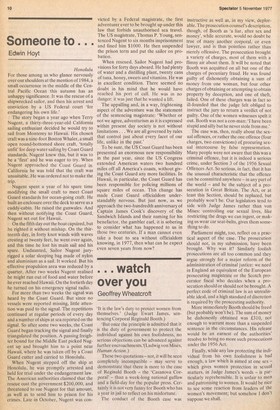Someone to
Edwin Hoyt
Honolulu For those among us who glance nervously over our shoulders at the mention of 1984, a small occurrence in the middle of the Central Pacific Ocean this autumn has an unhappy significance. It was the rescue of a shipwrecked sailor, and then his arrest and conviction by a US Federal court 'for endangering his own life.'
The story began a year ago when Terry Nugent, a thirty-three-year-old California sailing enthusiast decided he would try to sail from Monterey to Hawaii. His chosen craft was a nine-foot Boston Whaler, a small open round-bottomed shore craft, 'totally unfit' for deep water sailing by Coast Guard standards. Nugent knew this, but it was to be a 'first' and he was eager to try. When Nugent approached the Coast Guard in California he was told that the craft was unsuitable. He was ordered not to make the trip.
Nugent spent a year of his spare time modifying the small craft to meet Coast Guard standards for ocean-going craft. He built an enclosure over the deck to serve as a cuddy-cabin. He raised the gunwales. And then without notifying the Coast Guard, Nugent set out for Hawaii.
On the fifth day out the boat capsized, but he righted it without mishap. On the thirteenth day, in forty knot winds with waves cresting at twenty feet, he went over again, and this time he lost his main sail and his spare. Undaunted, Sailor Nugent juryrigged a solar sleeping bag made of nylon and aluminium as a sail. It worked. But his effective propulsion area was reduced by a quarter, After two weeks Nugent realised he might run out of food and water before he ever reached Hawaii. On the fortieth day he turned on his emergency signal radio.
For more than two weeks the signal was heard by the coast Guard. But since no vessels were reported missing, little attention was paid to the signal. The repetitions continued at regular periods of every day and a number of ships at sea reported on the signal. So after some two weeks, the Coast Guard began tracking the signal and finally triangulated the position. A passing freighter bound for the Middle East picked Nugent up and brought him to a point near Hawaii, where he was taken off by a Coast Guard cutter and carried to Honolulu.
When Nugent stepped off the ship at Honolulu, he was promptly arrested and held for trial under the endangerment law. The American authorities claimed that the rescue cost the government $200,000, and threatened to sue Nugent for that amount, as well as to send him to prison for his crimes. Late in October, Nugent was con victed by a Federal magistrate, the first adventurer ever to be brought up under this law that forbids unauthorised sea travel. The US magistrate, Thomas P. Young, sentenced Nugent to six months imprisonment and fined him $1000. He then suspended the prison term and put the sailor on probation.
When rescued, Sailor Nugent had provisions for forty days aboard. He had plenty of water and a distilling plant, twenty cans of tuna, honey, sweets and vitamins. He was in excellent condition. There seemed no doubt in his mind •that he would have reached his port of call. He was in no danger: it was just that he wanted a lift.
The appalling and, in a way, frightening aspect of the adventure was the statement of the sentencing magistrate: 'Whether or not we agree, adventurism as it is expressed within present day society is not without limitations. . . We are all governed by rules that control just about every facet of our life, unlike in the past.'
To be sure, the US Coast Guard has been presented an enormous new responsibility in the past year, since the US Congress extended American waters two hundred miles off all America's coasts, without giving the Coast Guard any more facilities. In Hawaii, in particular, the Coast Guard has been responsible for policing millions of square miles of ocean. This change has made Coast Guard officialdom understandably nervous. But just now, as we approach the two-hundredth anniversary of Captain James Cook's discovery of the Sandwich Islands and their naming for his benefactor, the gambler earl, it is sobering to consider what has happened to us in those two centuries. If a man cannot even take a boat to sea without officialdom knowing, in 1977, then what can he expect even seven years from now?


































 Previous page
Previous page